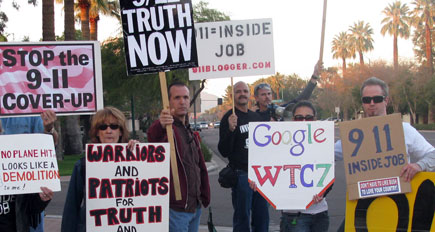Wasn’t information supposed to set us free? I guess it did, but perhaps not in the way we expected.
The decentralization of the media was to make us all “citizen reporters,” to gift each of us with our own personal printing press. We would finally get to the truth, with crazy conspiracy theories no longer able to run amok. But it hasn’t worked out that way. Clearly, we still see what we want to see despite what’s in plain sight, and the new normal may actually be better suited to Alex Jones than Edward R. Murrow.
On hearing about the death of Justice Antonin Scalia, an obese 79-year-old smoker who suffered from coronary artery disease, diabetes, sleep apnea, degenerative joint disease, COPD and high blood pressure, some Americans were immediately convinced there was a conspiracy, a cover-up, perhaps murder. File this cockamamie story with the ones about President Obama invading Texas and the regular stream of fictions from 9/11 Truthers, anti-Vaxxers and Sandy Hook deniers.
Scott Timberg has conducted a Salon Q&A with political scientist Joseph Uscinski on the topic. The subject says conspiracies are prevalent among those who are powerless, but I’ll argue it extends to people who feel powerless even when they’re really not. An exchange about the psychological underpinnings of conspiracists:
Question:
To what extent is conspiracy a personal thing — having to do with individual psychology — and to what extent is it social and political conditions priming people to see patterns?
Joseph Uscinski:
Those are two very good and separate questions.
There are a lot of psychologists working on this right now, trying to find what are the correlates to belief in conspiracy theories. The things we find are that people who are powerless tend to believe in conspiracy theories, people who feel animosity, people who have a lack of interpersonal trust … There clearly is an underlying psychological link – a worldview.
As far as the second question, things will drive conspiracy theorizing. When Obama was elected, all of a sudden 9/11 conspiracy theories effectively disappeared from our vernacular. And theories about Democrats and Obama and Communists overtook them. And we see that over time.
One of the things we did in the book was look at letters to the editor of the New York Times over 120 years. And we read about 120,000 letters and picked out the ones that talked about conspiracy theories. Over time, whoever was in the presidency, it was them, their party, their coalition that got all the accusations made at them. Usually by the out party.
And then when power switches hands, when a new president from a new party comes in, all of a sudden the conspiracy theories switch. So for the last seven years everything is, “Obama did this, to get something. He shot the kids in Sandy Hook to get gun control. He blew up the oil well in Deep Horizon to get green energy policy. He faked his birth certificate.”
Conspiracy theories almost always talk about the person with the most power. So when there’s a new president, it will be that person accused of all the bad stuff.
So conspiracy theories are really for losers – for people who are on the losing end of the election, people who are out of power …•
Tags: Joseph Uscinski, Scott Timberg

